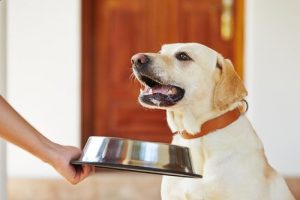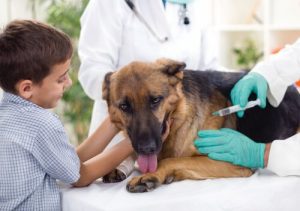What Should You Do If Your Dog Loses His Appetite?


Written and verified by the lawyer Francisco María García
Your dog’s diet is extremely important. Just like with humans, the food that enters your dog’s mouth can make him either healthy or ill. If your dog has healthy eating habits, he’ll be strong and rarely sick. However, if he doesn’t eat a balanced diet, there are no guarantees. So, what does it mean if your dog loses his appetite?
Symptoms of change
When a dog loses his appetite or stops eating, it’s a sign that something is not right. Whether it’s an emotional problem, medication-related, or from an illness, not eating can have serious consequences — even death.

It’s important to find out if your dog really has lost their appetite, or if you’re misreading the situation. Although dog food packaging will indicate the recommended serving size, it’s perfectly normal that your dog might not eat all of it. They may eat just 60 to 70% of what the instructions say.
Possible reasons behind a loss of appetite
As soon as you notice that your dog has lost his appetite, you need to identify the cause. To do this, it’s best to consult a specialist, as they’ll know exactly what’s going on and you’ll avoid false diagnoses.
Some reasons your dog could lose his appetite are:
Inadequate Food
A dog’s diet needs to change as they get older. As their body develops, their needs change. For example, an older dog should not consume the same amount of fats as a young dog or puppy. It’s quite common for people to forget to vary their dog’s diet because they’re simply too busy.
Routine
One of the most common reasons a dog loses his appetite is that he’s just tired of the routine. He’s lost interest in the food and would appreciate a little variety.
Sickness
Sometimes, a loss of appetite is a symptom of a physical illness, such as cancer, kidney failure, intestinal problems, or liver problems. It can also occur as the result of a psychological imbalance caused by depression, anxiety, or stress. Additionally, it could be caused by pain or fever.
Some medications, like antibiotics and anti-inflammatories, can cause loss of appetite. If your dog is receiving treatment and is taking a lot of medication, you should consult your vet. Loss of appetite could be a side effect.
Changes in Environment
Changes in the weather or social interactions within the family can destabilize your dog, making them stop eating. If there are problems, tension, or fighting within the family, this could be the result.
Vaccinations
After getting vaccinations, it’s quite normal that a dog loses his appetite. Vaccinations cause changes in his immune system, which can make things “off” somewhat, leading to a loss of appetite. Normally, it shouldn’t last over 48 hours after the vaccination. If it goes longer, see a vet.

Detox
Sometimes dogs stop eating to detoxify themselves. It’s a natural thing dogs to to get rid of the toxins that have accumulated in their bodies. If your dog loses his appetite, he could possibly go 2 days without eating and be okay. Longer than this could be risky for their health. Note: hydration is important. Although your dog may have no appetite, they should still stay well hydrated.
What should you do if your dog loses his appetite?
- Take your dog to a vet so he can get treated and get his appetite back.
- Feed him at the right times during the day, twice a day: once in the morning and again at night. This way, you’ll be able to see if it’s related to the time of day or if it’s constant throughout the day.
- Don’t feed your dog too many treats.
- Ask your vet for a proper eating plan for your dog.
- Love your dog. If he’s sad or depressed, he may stop eating.
- Encourage your dog to eat. You can do this by mixing their food with tasty broth or adding little pieces of meat (without spices or sauce).
- Create an exercise routine, particularly before meals, to help build up his appetite.
Your dog’s diet is extremely important. Just like with humans, the food that enters your dog’s mouth can make him either healthy or ill. If your dog has healthy eating habits, he’ll be strong and rarely sick. However, if he doesn’t eat a balanced diet, there are no guarantees. So, what does it mean if your dog loses his appetite?
Symptoms of change
When a dog loses his appetite or stops eating, it’s a sign that something is not right. Whether it’s an emotional problem, medication-related, or from an illness, not eating can have serious consequences — even death.

It’s important to find out if your dog really has lost their appetite, or if you’re misreading the situation. Although dog food packaging will indicate the recommended serving size, it’s perfectly normal that your dog might not eat all of it. They may eat just 60 to 70% of what the instructions say.
Possible reasons behind a loss of appetite
As soon as you notice that your dog has lost his appetite, you need to identify the cause. To do this, it’s best to consult a specialist, as they’ll know exactly what’s going on and you’ll avoid false diagnoses.
Some reasons your dog could lose his appetite are:
Inadequate Food
A dog’s diet needs to change as they get older. As their body develops, their needs change. For example, an older dog should not consume the same amount of fats as a young dog or puppy. It’s quite common for people to forget to vary their dog’s diet because they’re simply too busy.
Routine
One of the most common reasons a dog loses his appetite is that he’s just tired of the routine. He’s lost interest in the food and would appreciate a little variety.
Sickness
Sometimes, a loss of appetite is a symptom of a physical illness, such as cancer, kidney failure, intestinal problems, or liver problems. It can also occur as the result of a psychological imbalance caused by depression, anxiety, or stress. Additionally, it could be caused by pain or fever.
Some medications, like antibiotics and anti-inflammatories, can cause loss of appetite. If your dog is receiving treatment and is taking a lot of medication, you should consult your vet. Loss of appetite could be a side effect.
Changes in Environment
Changes in the weather or social interactions within the family can destabilize your dog, making them stop eating. If there are problems, tension, or fighting within the family, this could be the result.
Vaccinations
After getting vaccinations, it’s quite normal that a dog loses his appetite. Vaccinations cause changes in his immune system, which can make things “off” somewhat, leading to a loss of appetite. Normally, it shouldn’t last over 48 hours after the vaccination. If it goes longer, see a vet.

Detox
Sometimes dogs stop eating to detoxify themselves. It’s a natural thing dogs to to get rid of the toxins that have accumulated in their bodies. If your dog loses his appetite, he could possibly go 2 days without eating and be okay. Longer than this could be risky for their health. Note: hydration is important. Although your dog may have no appetite, they should still stay well hydrated.
What should you do if your dog loses his appetite?
- Take your dog to a vet so he can get treated and get his appetite back.
- Feed him at the right times during the day, twice a day: once in the morning and again at night. This way, you’ll be able to see if it’s related to the time of day or if it’s constant throughout the day.
- Don’t feed your dog too many treats.
- Ask your vet for a proper eating plan for your dog.
- Love your dog. If he’s sad or depressed, he may stop eating.
- Encourage your dog to eat. You can do this by mixing their food with tasty broth or adding little pieces of meat (without spices or sauce).
- Create an exercise routine, particularly before meals, to help build up his appetite.
All cited sources were thoroughly reviewed by our team to ensure their quality, reliability, currency, and validity. The bibliography of this article was considered reliable and of academic or scientific accuracy.
- Bontempo, V. (2005). Nutrition and health of dogs and cats: evolution of petfood. Veterinary research communications, 29(2), 45-50.
- Shmalberg, J. (2014). Part 1: Canine performance nutrition. Tod. Vet. Pract, 4, 72-76.
- Delaney, S. J. (2006). Management of anorexia in dogs and cats. Veterinary Clinics: Small Animal Practice, 36(6), 1243-1249.
- Gawor, J. P., Reiter, A. M., Jodkowska, K., Kurski, G., Wojtacki, M. P., & Kurek, A. (2006). Influence of diet on oral health in cats and dogs. The Journal of nutrition, 136(7), 2021S-2023S.
This text is provided for informational purposes only and does not replace consultation with a professional. If in doubt, consult your specialist.








